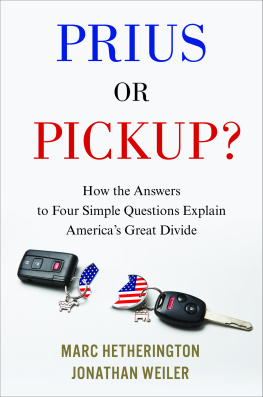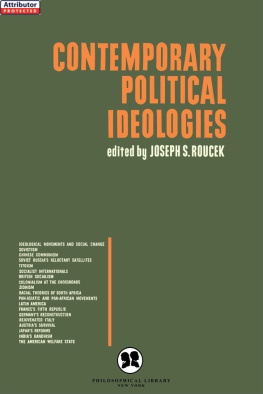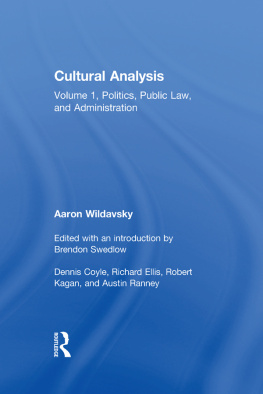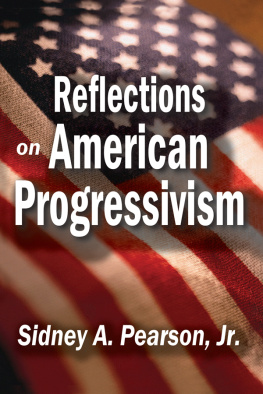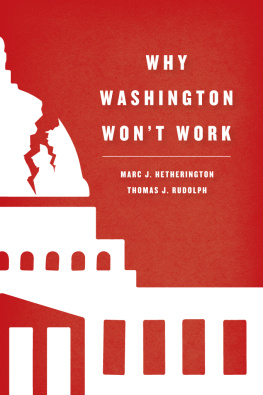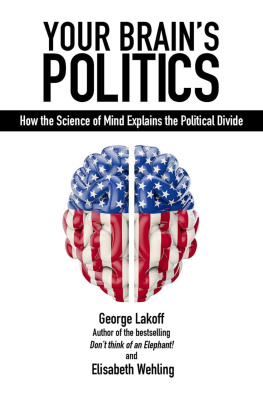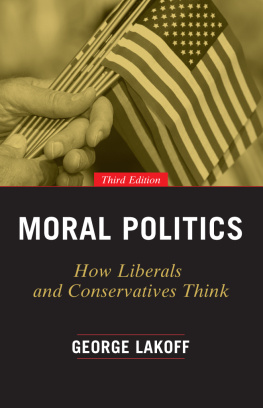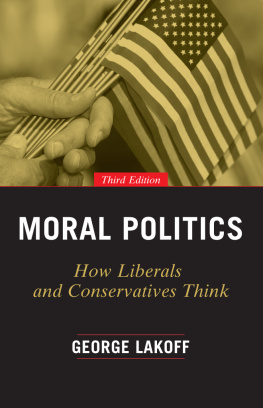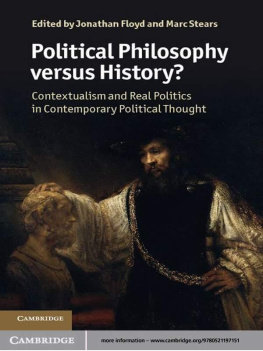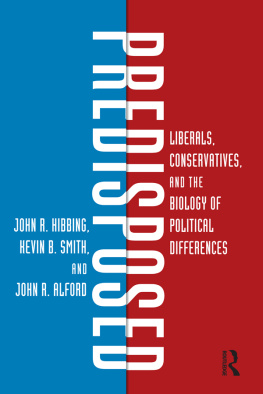Copyright 2018 by Marc Hetherington and Jonathan Weiler
All rights reserved
For information about permission to reproduce selections from this book, write to or to Permissions, Houghton Mifflin Harcourt Publishing Company, 3 Park Avenue, 19th Floor, New York, New York 10016.
hmhbooks.com
Library of Congress Cataloging-in-Publication Data
Names: Hetherington, Marc J., 1968 author. | Weiler, Jonathan, 1965 author.
Title: Prius or pickup? : how the answers to four simple questions explain America's great divide / Marc Hetherington & Jonathan Weiler.
Description: Boston : Houghton Mifflin Harcourt, 2018. | Includes bibliographical references and index.
Identifiers: LCCN 2018012316 (print) | LCCN 2018029492 (ebook) | ISBN 9781328866813 (ebook) | ISBN 9781328866783 (hardback)
Subjects: LCSH: Political cultureUnited States. | Polarization (Social sciences)United States. | Political psychologyUnited States. | BISAC: POLITICAL SCIENCE / Political Ideologies / Conservatism & Liberalism. | POLITICAL SCIENCE / Political Ideologies / Fascism & Totalitarianism. | PSYCHOLOGY / Social Psychology. | PSYCHOLOGY / Personality.
Classification: LCC JK1726 (ebook) | LCC JK1726 .H47 2018 (print) | DDC 306.20973dc23
LC record available at https://lccn.loc.gov/2018012316
Graphs and charts by Mapping Specialists, Ltd.
Cover design by Martha Kennedy
Cover photography by Guy Jarvis
Hetherington photograph Vanderbilt University
Weiler photograph courtesy of the author
v2.1218
To our parentsone fixed, one mixed,
two fluid, all wonderful
Introduction
IF YOU HAD TO BUY a new car, would you be more likely to choose a Prius or a pickup truck?
When you imagine your favorite meal, does it feature classic American dishes like meatloaf and mashed potatoes? Or do you crave more exotic fare, like chicken curry and vegetable biryani?
When you turn on the radio, do you listen to country music or oldies? Or is your dial set to stations that play hip-hop, reggae, or electronic dance music?
If youve ever had the opportunity to choose a name for a child, have you opted for names beginning with soft-sounding letters, such as Louise or Sean, or hard-sounding ones, like David, Katherine, or Tom?
These might seem like odd questions for two political scientists to be asking. But before we explain, bear with us for one more:
When you think about the values you want children to have, do these qualities include things like respect for elders, obedience, and good manners and behavior? Or would you prefer that children be independent, self-reliant, curious, and considerate?
All of these questions have something in common. They tell us something important about the way you view the worldand also about the way you vote.
To understand why these questions are so revealing, consider an anecdote shared by the MSNBC host Joe Scarborough, a former Republican congressman, in a 2013 television documentary. The subject of the filmthe making of All the Presidents Men, the landmark movie about Watergategave Scarborough the opportunity to recall his upbringing during the tumultuous 1960s. Back then, protest and violence were being broadcast into Americans homes on a nightly basis. Republican Richard Nixon was competing with Vice President Hubert Humphrey for the nations highest office, and the two men had very different ideas about the solutions to all that tumult. Although he was just a small boy at the time, Scarborough knew that the country was divided both culturally and politically, and that people had to choose sides. And the choice was clear. Did you want to join the side of Jane Fonda or John Wayne? he asked, rhetorically. My parents chose John Wayne, which meant they chose Nixon.
Consider those two personalities for a moment. John Wayne was tough, the kind of guy who could keep good people safe and set bad guys straight. He was a throwback to a simpler time when men were men. Everyone knew he was the boss. Jane Fonda, on the other hand, symbolized opposition to the war in Vietnam. She had the gall to question the authority of her leaders and encouraged others to try to understand the war through the eyes of Americas enemies in the conflict, the North Vietnamese, earning her the moniker Hanoi Jane from her many detractors.
Not everyone alive today is familiar with the mid-twentieth-century incarnations of John Wayne and Jane Fonda, but the archetypes they represent are still with us, even if the names embodying them have changed with time. The political equivalent of John Wayne is now, perhaps, Clint Eastwood. The likes of, say, Ellen DeGeneres now represent what Jane Fonda embodied in the 1960s.
More than political styles, these icons represent something akin to personality types. One group stands for toughness, the other for empathy and compassion. More basically, each of them stands for a particular outlook on lifeor, as we term it, a specific worldview.
The term worldview is a catchall for someones deeply ingrained beliefs about the nature of the world and the priorities of a good society. Worldview can encompass all sorts of cultural considerations, such as ideas about philosophy and morality. It is also, and even more significantly, shaped by psychological influences such as your emotions and the imprint left by past experiences.
Of the many factors that make up your worldview, one is more fundamental than any other in determining which side of the divide you gravitate toward: your perception of how dangerous the world is. Fear is perhaps our most primal instinct, after all, so its only logical that peoples level of fearfulness informs their outlook on life.
If you perceive the world as more dangerous, then John Wayne or Clint Eastwoodstrength and fortitudeis the antidote. And if you see the world that way, youre also more likely to prefer to drive a big, sturdy vehicle, have a large, obedient dog for a pet, and vote Republican.
If you see the world as less perilous, you feel freer to embrace your inner Jane Fonda or Ellen DeGeneres, and to work harder to understand the perspectives of people who are different from you. You are also, as it turns out, much more likely to eat Indian food, drive a hybrid car, give your kid a gentle-sounding name, and vote for liberal political candidates.
Dont take it from us. Evidence for the connection between worldview and politics can be readily seen in public opinion data collected during the 2016 US presidential campaign. A random sample of Americans was asked which of the following two statements came closest to their view:
Our lives are threatened by terrorists, criminals, and illegal immigrants and our priority should be to protect ourselves.
Its a big, beautiful world, mostly full of good people, and we must find a way to embrace each other and not allow ourselves to become isolated.
About half of the surveys respondents chose each option, suggesting that Americans are split roughly evenly between the opposing worldviews represented by Jane Fonda and John Wayne. What is more significant, however, is the politics of the people who responded one way or the other. Nearly 80 percent of Donald Trump supporters chose the first statement. Nearly 80 percent of Hillary Clinton supporters agreed with the second.
By any reckoning, this is a huge gap, and its especially significant when you consider that the question didnt ask people about their ideologythat is, whether respondents were conservative or liberal. Rather, the question was about their outlook on life: something that is deeper and more visceral, but which nevertheless seems to be intimately connected to their political preferences.
Peoples responses to this simple question about worldview seem to map neatly onto other preferences, as wellpreferences that, at first glance, appear to have little to do with physical safety. Those Americans who perceive physical threats as ubiquitous also tend to be more suspicious of people who dont look like them and to believe that threats stemming from cultural change, including mass immigration, lurk around nearly every corner. Similarly, people who perceive their surroundings as a big, beautiful world rather than a veritable snake pit are also less likely to think that racial and cultural changes are at all dangerous. Indeed, theyre much more likely to believe that the real danger lies in failing to

